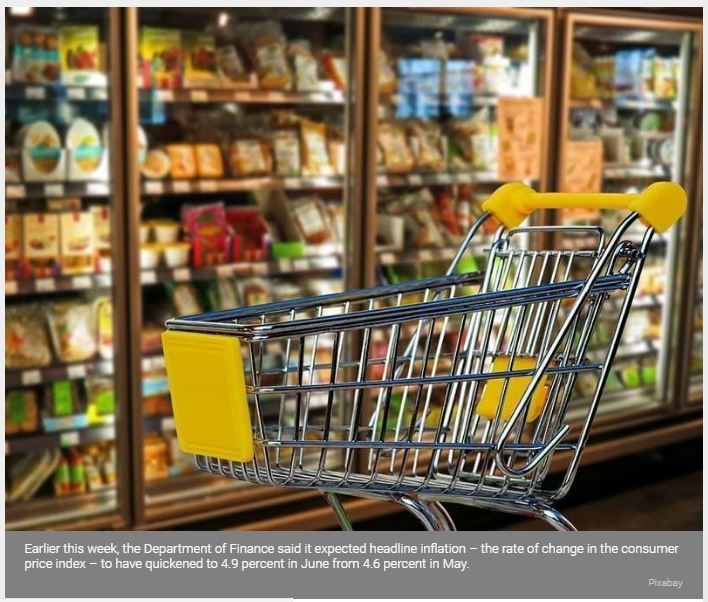Philippines: Inflation spikes by ‘unexpected’ 5.2% in June
MANILA, Philippines — Prices of goods and services further spiked by 5.2 percent in June, the highest in more than five years and significantly surpassing market expectations, taking even economic managers by surprise.
Earlier this week, the Department of Finance said it expected headline inflation – the rate of change in the consumer price index – to have quickened to 4.9 percent in June from 4.6 percent in May.
The Philippine Statistics Authority (PSA) yesterday reported the significantly faster growth in consumer prices were primarily attributed to the heavily weighted food and non-alcoholic beverages, which registered a 6.1 percent growth. Faster increases were also registered in the indices of alcoholic beverages and tobacco; housing, water, electricity, gas and other fuels; furnishing, household equipment and routine maintenance of the house; transport; communication and education.
In Metro Manila alone, inflation accelerated by 5.8 percent last month from 4.9 percent the prior month and 3.1 percent in June 2017.
“It was rather unexpected as most observers and we ourselves did not expect inflation to spike in this manner,” said Socioeconomic Planning Secretary Ernesto Pernia in a briefing yesterday.
He attributed the sharp rise in consumer prices mainly to the so-called interaction effect of various contributing factors to inflation such as rising global crude oil costs, peso depreciation, and higher rice prices.
“When these factors are combined, the effect can be amplified,” said Pernia. “Let us not blame the TRAIN (Tax Reform for Acceleration and Inclusion) law.”
He likewise noted that the average inflation rate from January to June registered at 4.3 percent, still well within the revised government outlook of four percent to 4.5 percent.
He also expressed confidence that inflation would peak by the third quarter of the year and begin tapering off soon after on expectations of easing world oil prices, increased rice supply as imports come in, and high hopes that the rice tariffication bill can be passed to bring down the cost of the staple.
Pernia also said second quarter economic growth is expected to be robust despite rising inflation.
“The GDP growth is going to be good for the second quarter, of course it would be better without inflation,” he said.
Pernia said measures must be implemented to increase the supply of goods and services – particularly food supply – to manage inflation.
“Our food supply must match the demand in a fast-growing economy,” he said.
He also stressed the need to initiate measures that would boost the productivity of the agriculture sector and address the high cost of bringing agricultural products to markets.
“These may not produce immediate results but are crucial in managing inflation over the longer term. In the meantime, to beef up our country’s food supply, we should maximize trade opportunities with our ASEAN partners,” he said.
“Also, we need to strictly monitor prices to avoid profiteering, implement the Pantawid Pasada, and the PUV modernization programs, and for Congress to prioritize the amendment of the Agriculture Tariffication Law,” he added.
He said NEDA also supports the labor department’s proposal of providing unconditional cash transfers to minimum wage earners.
The central bank has been responding to rising inflation with a series of policy rate hikes. Asked if the BSP has been slow to respond to creeping inflation, Pernia said the Monetary Board may have had a “slip in timing.”
“They may have been a little bit of a slip in timing for increasing policy rates,” he said.
Source: https://www.philstar.com/business/2018/07/06/1830864/inflation-spikes-unexpected-52-june


 English
English




